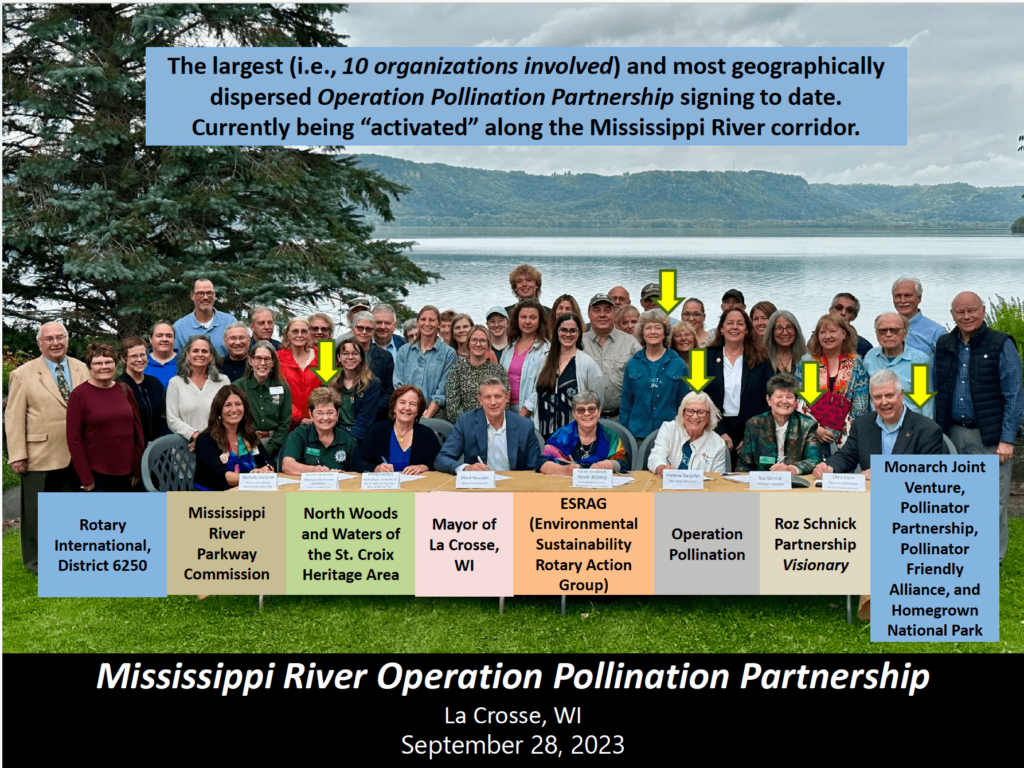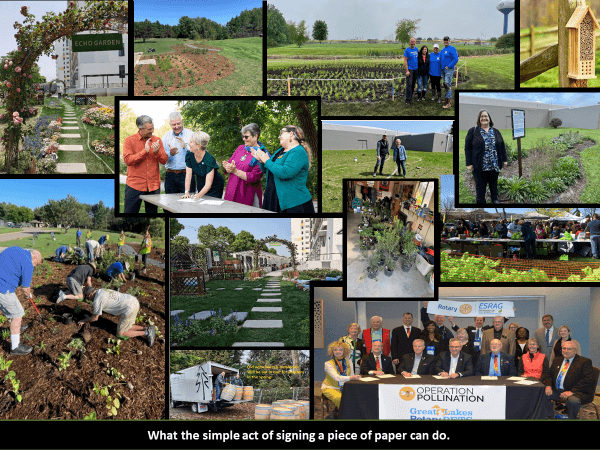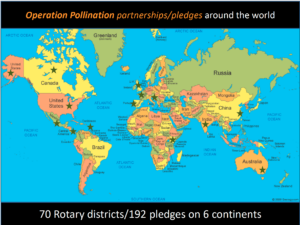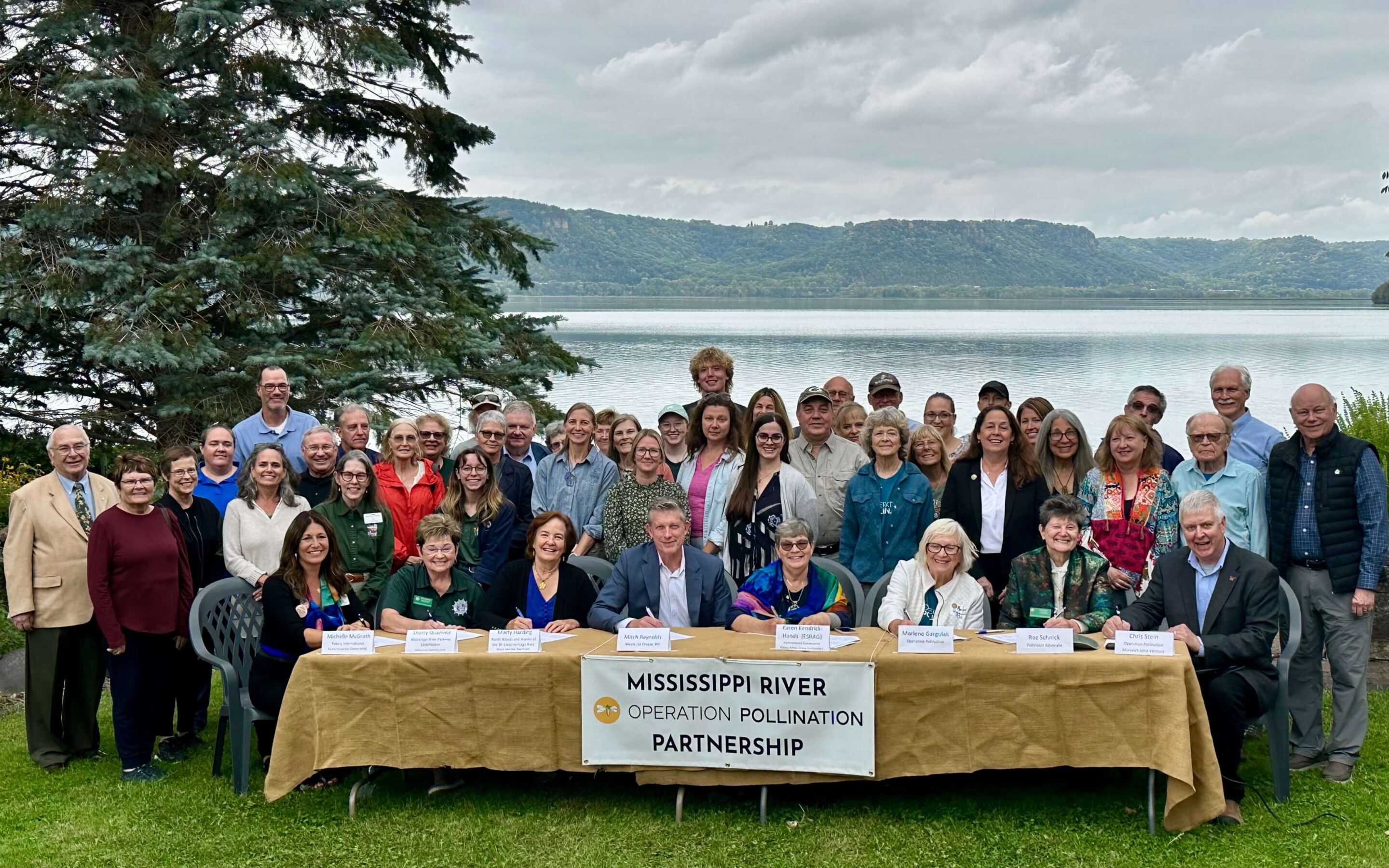By Chris Stein, Chair, ESRAG Pollinator Task Force
A few years ago, after reading the October 2020 Rotary Magazine article about ESRAG’s Operation Pollination environmental framework, Rotarian Rosalie (Roz) Schnick was inspired to take action to help protect pollinator biodiversity health along the entire length of the Mississippi River. In the article, Roz discovered that then-District Governor Marlene Gargulak of District 5960 wanted to engage Rotarians and others from Canada to Mexico to help the Monarch Butterfly.
As the co-chair of the Environmental Committee of the Rotary Club and the La Crosse County (Wisconsin, USA) Commissioner of the Mississippi River Parkway Commission, she proposed the idea of the Mississippi River Operation Pollination Partnership in April, 2021, and set to work to bring Rotarians and other stakeholders together to make it happen.

Signing of the Mississippi River Operation Pollination Partnership.
On a magnificent fall afternoon in late September, 2023, on the banks of the Mississippi River in La Crosse, Wisconsin, ten prominent organizations including Rotary District 6250, ESRAG, the Mississippi Parkway Commission, Monarch Joint Venture, the City of La Crosse, and North Woods and Waters of the St. Croix Heritage Area joined forces at Roz Schnick’s home and meeting place – aptly named “The Monarchy” – for a joyful ceremony to sign the Mississippi River Operation Pollination Partnership resolution.
“Whereas more than 85% of the world’s flowering plants and many of the world’s food crops depend on pollination to be successful,” the resolution states, and “given the breadth, severity, and persistence of pollinator losses, it is critical to expand efforts to reverse these losses and restore populations to healthy levels.”
The signatories set out their vision: “Through cooperation, collaboration, and outreach resulting from this non-binding Pollinator Partnership, an interconnected mosaic of pollinator habitat may be developed to help restore and maintain populations of pollinator species throughout this region.”
Now, at the start of the new year, these ten organizations have begun to activate this Mississippi River Partnership with their members and partners. Each organization that signed the

Gallery of ideas for Operation Pollination, including planting a pollinator garden and helping other organizations restore land.
Partnership has a champion whose job is to recruit other members/partners who will sign a non-binding Pollinator Pledge that states what they plan to do to help pollinator biodiversity. What an organization’s leader puts on their Pollinator Pledge is totally up to them. At its core, Operation Pollination is non-prescriptive. However, we gladly offer ideas. They can choose among a wide range of actions, including:
- Plant a pollinator garden.
- Hand out seed packets to school children.
- Stop or reduce pesticide use.
- No-Mow May.
- Present educational programs to their communities.
- Help other organizations restore land.
- Support a pollinator organization.
Most of the 198 organizations who have signed a Pollinator Pledge to date have decided to plant a pollinator garden. These gardens can be as small as a few square feet.
In southwest Wisconsin, District Governor Michelle McGrath (District 6250), who signed the Partnership in September, is working to recruit the twenty other Rotary districts that touch the Mississippi River to adopt the cause. These districts will then recruit their clubs to sign pledges. This strategy applies to all of the partners who signed the “master” Partnership.
So, on a beautiful fall afternoon on the banks of the Mississippi River, the beginning of Rotarian Roz Schnick’s dream to protect pollinator biodiversity came true. Now, it’s up to the people and organizations who live and work in this nationally significant Mississippi River space to take action on behalf of pollinators for biodiversity health.
Operation Pollination is an environmental framework that can easily be replicated in Rotary Districts across the globe. If you would like more information about this easy- to implement framework and
how your District/Club can get involved, please contact me at [email protected] or +1 402-881-1387.

Map highlighting areas around the world that pledged or partnered with Operation Pollination.
Chris Stein is a member of Twin Cities Rotary EcoClub in Minnesota, USA. He is Chief, National Heritage Areas and Community Conservation Partnerships for the US National Park Service, Midwest Region. The photo of the Mississippi River Operation Pollination Partnership signing is by Gary Nolen.

